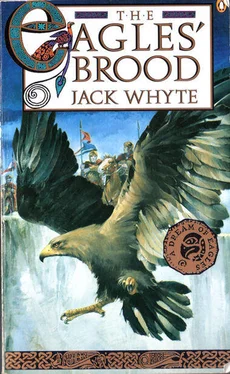"They fought when they first came. Of course they did. They were unwelcome, and the land was disputed. But now the land is theirs, and they maintain it better, in most cases, than the people who were there before them did. The Romans fought when first they came here, too. They came as conquerors, remember. Only after all the fighting was done did this land of ours settle down to prosperity."
His eloquence in front of me, a stranger, was probably due, I decided, to the quality and quantity of the wine we had been drinking, but I was unhappy with the way he had demolished my objections.
"The Romans came here for a purpose," I said, hearing the wine and truculence in my own voice. "And they were good for Britain. I myself am of Roman descent."
Eric was grinning widely now, his eyes dancing with mischief. "Of course the Romans came here for a purpose. They came to conquer and to pillage. They came in search of tin and gold and precious treasures. And then they stayed." He shrugged his shoulders, spreading his palms. "But that was centuries ago. I am not decrying them—neither them nor your Roman blood, Merlyn—but who is to say the Roman purpose was more noble than the Saxons' is? Is it impossible that some of your future children may bear the blood of Saxons mingled with your Roman blood?"
"By God, I hope it is!"
Lars cleared his throat loudly, drawing my eyes to him. He had decided it was time to change the subject. I watched him now looking at my clothing, noting the style of it. "You're Roman, you say? Forgive me if you think I'm being inquisitive, but Merlyn sounds like no Roman name I've ever come across."
I felt a smile tugging at my lips in the face of his obvious desire to lead our conversation into quieter paths. "That's true. I am half Celt, and Merlyn marks me, but my name is Britannicus—Caius Merlyn Britannicus."
"Britannicus?" His expression quickened. "Are you from up Aquae Sulis way?"
"Close by. About thirty-five miles south-west of there. Why?"
"It's an unusual name. A friend of my father's had a friend from Aquae Sulis called Britannicus, a long time ago. He went to live there. Name of Varrus. He was a smith, walked with a limp. Why are you smiling?"
My smile had become a huge grin and I leaned towards him now, across the table. "Because I can hardly credit what I'm hearing. Varrus! The friend you speak of was my grandfather, Caius Britannicus. Publius Varrus married his sister, my great-aunt Luceiia."
"Get away! Well I'm damned!" He was staring at me, wide-eyed. "Did you ever know his friend Equus? That was my father."
I could hardly contain my astonishment and delight. "Equus was your father? I knew him well, when I was a small boy. He lived with us. But why don't I know you? I've known your brothers from my infancy."
"Joseph and Carol. Well I'm damned!" He reached across the table and picked up the wine jug to give himself time to absorb what he was hearing, pouring another cup for all of us. "You knew Joseph and Carol? I was the eldest. Ran away and joined the legions when I was just a younker living in Colchester. Didn't want to waste my life in a dirty old smithy. Wasted it in the dirty old army, instead. Got back years later to find they'd all moved away to the west somewhere. So you knew Joseph and Carol? Well I'm damned."
"Knew? Lars, I still know them! They're in Camulod, our colony. They operate our smithies nowadays."
He looked at me strangely and I sensed a sudden stillness in the others who had been hanging on our every word. "Camulod? Uther Pendragon's place? They live there? You live there?"
I was taken aback. His tone said quite clearly, unmistakably, that he had thought only monsters and outlaws lived in Camulod.
"Well, yes, they live there, and so do I, but I would hardly call it 'Uther Pendragon's place.' Uther lives there, part of the time, and commands our forces for the time being, in the war against Lot of Cornwall, but his kingdom—his 'place' as you call it—is in the mountains of Cambria, several days' ride to the north-west. Believe me, Camulod is far from being Uther Pendragon's place, or anyone else's. It's a thriving community, held and maintained by its colonists. You've obviously never been there."
He made a derisive sound in his throat and shook his head in a brief, abrupt negative. I frowned, unable to believe what I was hearing.
"Why not?" I continued. "It's not that far from here, no more than fifty miles." I was even more disconcerted now to see hostility and fear in his face and I glanced at the others, to see it mirrored in theirs. I rushed on, eager to find the source of it. "Good God, Lars, you all look as though you're afraid of the place and all it contains! Why? Your two brothers are there, and I live there, and it was founded and built by people like your own father and his friends. Why should anyone—and you of all people—be afraid of the very name of it?" It was evident that he was not going to answer me, and I had a sudden revelation. "Or is it Uther Pendragon you fear?"
His face darkened, rigid with hostility at the very mention of Uther's name, and I knew I was correct. "Why, Lars?" I was insistent. "Why should you fear Uther Pendragon? Tell me."
He cleared his throat. "Ask Eric. And Brunna."
I turned to them, to include them in what had suddenly become a very personal matter.
An hour later, I had heard more than I ever sought to hear. Lars and his wife Brunna, and their extensive family in and around Isca and the surrounding villages and hamlets, were the ordinary people of this region. In their minds "there was no difference between Uther of Camulod—how that name galled me!—and Lot of Cornwall. They thought of both men as demons incarnate. The armies of both had ravaged this entire countryside over the past three years, looting and killing and raping as they pleased. The local people had far less fear of Saxons than they had of their own kind.
Lars told me he had returned from his service with the legions almost twenty years earlier and had met and wed Brunna shortly after that. He had fought with Magnus Maximus, and then with Stilicho's legions after Magnus was killed. When the Emperor Honorius killed Stilicho, his own deputy and former Regent, Lars deserted and made for home, and the journey as a fugitive, ending finally in the quiet backwater of Isca, had taken him three years. Brunna's family had been merchants of some stature in Isca, and her father had set them up fifteen years ago in this hostelry. They had prospered for twelve years, until Lot of Cornwall decided to extend his territories by conquest.
The previous year, while I had been relearning how to live, both of their sons, aged fourteen and twelve, had been taken in a sweep by Uther's soldiers and hanged out of hand along with twenty other men suspected of giving aid and sustenance to the enemy. Two months after that, at harvest time, Brunna's youngest sister, a fifteen-year-old girl, had been ravished and killed, with three of her friends, by a party of Lot's people. The father and brother of the girl whose home they had been visiting were butchered while attempting to protect the girls.
The picture these simple people drew for me was clear. The "enemy," in their eyes, was anyone who was armed and rode a horse or marched carrying weapons. Uther Pendragon and Gulrhys Lot were monsters, and any trees beneath which they rode were likely to bear dangling, human fruit. Their very names carried with them the stench of rotting flesh and burning homesteads, and evoked chaos, screams of despair, and long, starving winters.
Their story drove the wine-fed euphoria from my head and I slept heavily that night. The following morning, I was on the road again, driving my horses hard along the road to and beyond Isca to the south-west. Lars and all his family would make their way as quickly as they could now to Camulod, bearing a letter from me to my aunt that would place them under my official protection. In the meantime, I rode hard, with my gaze focused on the road ahead of me, and on the confrontation with my cousin that lay at the end of it. I rode seething with a fury so great that it had almost displaced my personal grudge against Uther. To hear the name of Camulod spoken in fear and loathing had outraged all within me and made me rage at my own former, self- inflicted blindness. We had heard tales in Camulod of atrocities and vicious acts of terror being committed by our own, but had discounted them, choosing, in what I could now identify with ease as smug complacency, to attribute such tales to the lies and rumour-mongering of Lot and his creatures—fictitious calumnies concocted for the purpose of turning the people of our own lands against us. Now, shaken by the revelations of the previous night, I saw the Dream of Caius Britannicus and Publius Varrus reduced to smoking cinders in the terror of the people of this land around me. Where had the vision of my people gone? What had happened to their ideals of freedom and justice and dignity and worth; of free men, living and working in freedom, having the right to bear arms to protect that freedom against all usurpation, even by their own kind? I cursed the fate that had left me senseless of what was happening around me for two crucial years, and spurred my mount harder.
Читать дальше









